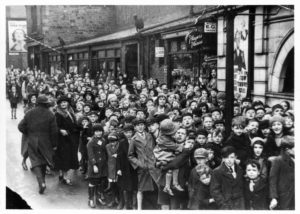Cinema Memory and the Digital Archive (CMDA) is about expanding our knowledge and understanding of how audiences relate to and remember the experience of cinemagoing. How is ‘going to the pictures’ remembered? How may these remembered experiences be expressed? In speech? In writing? Through a range of creative practices? What can such expressions tell us about how our memories of ‘going to the pictures’ figure in our daily lives?
The project’s starting point is the materials gathered in the course of ‘Cinema Culture in 1930s Britain’ (CCINTB), all of which are housed in Special Collections at Lancaster University Library. This valuable resource had previously been available to view only for those able to visit Lancaster in person.
Engaging 21st-century developments in digital humanities, Cinema Memory and the Digital Archive expands academic and public knowledge of these key aspects of the cinema experience. The entire CCINTB Collection is in the final process of being accessioned, catalogued, and digitised. Among the project’s principal outputs is a freely available website incorporating the CCINTB Collection and a range of other historical materials related to cinemagoing in interwar Britain and the cinemagoing experience more generally.
The CMDA website is accessible and valuable to anyone with an interest in cinema history, cultural history, cultural memory, and even family history. Searching the digital archive is designed to be intuitive, and the website is easy to navigate for everyone from first-time users of online archives to seasoned researchers.
In addition to the website, a number of public events and activities – including seminars, screenings, workshops and artists’ residencies – were held throughout the duration of the project, to help showcase the contents of the collection. Full details of these activities were publicised through the project blog and Twitter feed, with more to take place over the coming year.
Further details on the project team, its steering groups and funders can be found via the ‘About’ sub-menu above.
